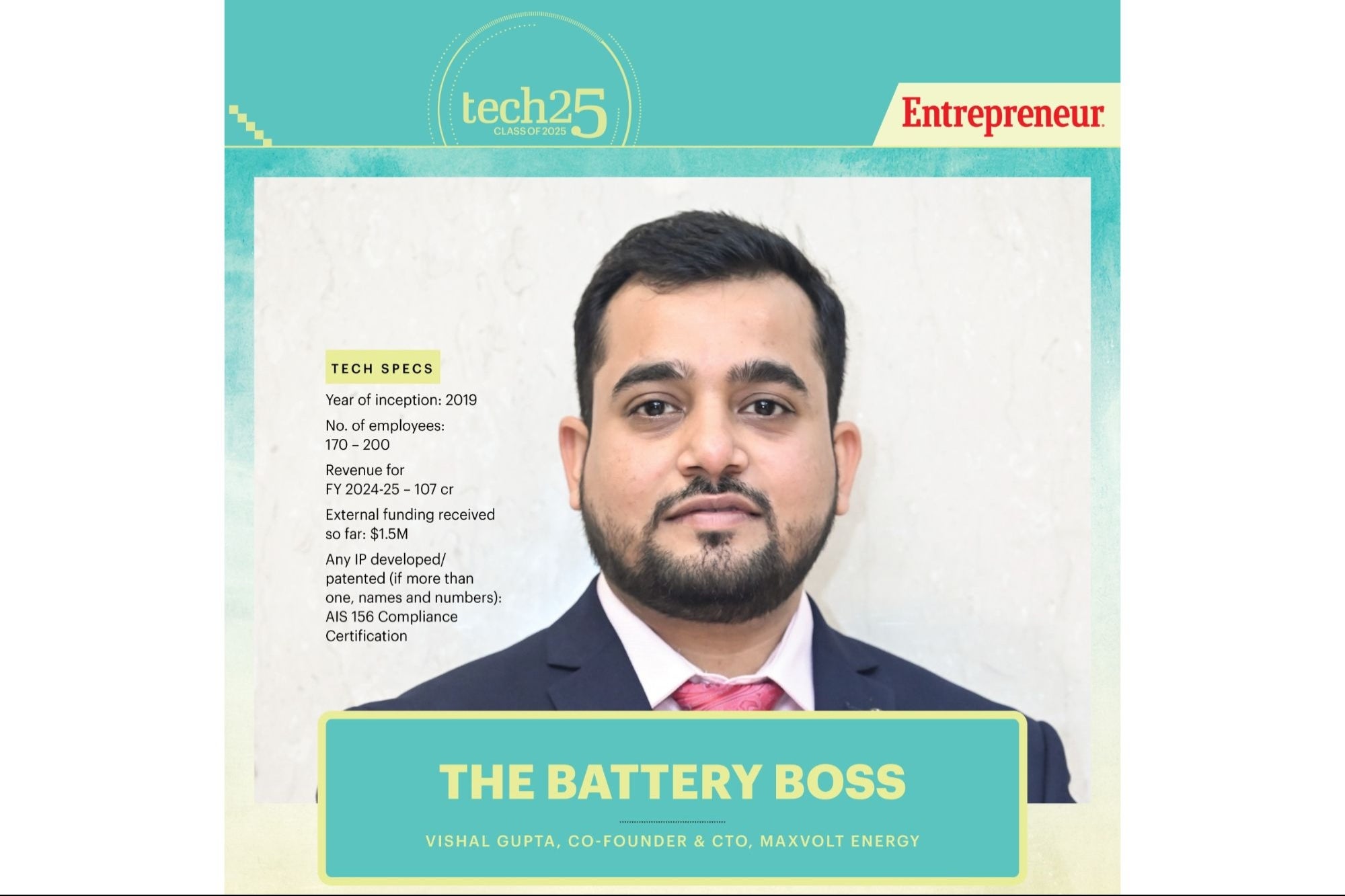The Battery Boss: Vishal Gupta, Co-Founder & CTO, MaxVolt Energy "Tomorrow belongs to those who innovate responsibly and anticipate evolving needs," he says. For MaxVolt, that means redefining energy consumption with solutions that are efficient, intelligent, and kind to the planet.
Opinions expressed by Entrepreneur contributors are their own.
You're reading Entrepreneur India, an international franchise of Entrepreneur Media.

In an industry cluttered with buzzwords and greenwashed ambition, Vishal Gupta, Co-Founder & CTO, MaxVolt Energy Industries Limited is doing the hard work: building smarter lithium batteries, rewriting the rules of energy infrastructure, and stacking up a growth story that reads more like an organisation's dream than a spreadsheet.
MaxVolt is not just keeping up with India's sustainable development goals; it's designing the fast lane. The company's lithium batteries power electric vehicles, energy storage systems, medical devices, and consumer electronics, with the kind of technical muscle that makes competitors glance sideways. "We've integrated active balancer technology, a superior thermal management system, and an intelligent battery control mechanism," says Gupta, clearly proud but practical. It's this holy trinity of innovation that boosts safety, enhances longevity, and dials up the overall efficiency of their offerings.
But the real kicker? Their latest showpiece—the smart lithium inverter series. These future-proof wall-mounted inverters aren't just sleek; they're battery agnostic. Whether lithium or lead, MaxVolt's inverter doesn't flinch. It's like the benchmark of power backup: smarter, leaner, and practically plug-and-play.
Still, all the tech in the world won't matter if it ends up in a landfill. That's why MaxVolt is putting just as much muscle behind lithium battery recycling as they are in production. Their R&D department isn't content to follow—it's paving the way for a circular battery economy, reclaiming material value and reducing environmental fallout. "We're working to create a holistic ecosystem that includes production, usage, reuse, and recycling," Gupta explains. "It's about shaping the sustainable energy infrastructure India needs—not just today, but decades from now."
Of course, the clearest sign that MaxVolt is doing something right isn't in the lab—it's in the ledger. FY 2023-24 saw revenue skyrocket by 253 per cent to INR 48.37 crore, with profits of INR 5.21 crore. And just when you think that's peak performance, MaxVolt tops itself: FY 2024-25 revenue crossed INR 107 crore. That's not growth. That's warp speed.
Their impact isn't just economic. With operations now touching over 19,000 pin codes and a staff that's grown to more than 170 employees, MaxVolt is not only making clean tech accessible, but local as well. Their batteries are fueling OEMs, solar farms, EV fleets, and consumers across India, with tech robust enough for grid-scale storage but smart enough for your living room.
How does a company stay relevant in a space where yesterday's cutting-edge is tomorrow's obsolete? MaxVolt's answer is deceptively simple: innovate or die. "We've built a culture of cross-functional collaboration, supported by advanced ERP systems," Gupta says. But it's the R&D division that he keeps circling back to. For Gupta, innovation isn't a quarterly goal, it's a survival trait. His team constantly tweaks, tests, and tunes in to international trends and domestic demands alike.
Yet, challenges persist—and not the kind that come with a line item. India's dependence on imported lithium cells, mostly from China, could have clipped MaxVolt's ambitions early. But instead of whining about global supply chains, they did what engineers do best; they got to work. "We tackled this with in-house prototyping, strategic partnerships, and a significant R&D push," Gupta says. Their upcoming lithium battery recycling facility is a masterstroke, poised to cut import reliance and elevate lifecycle management standards across the board.
So where does the road lead from here? According to Gupta, it leads through expansion. Phase 2 of MaxVolt's production plan is underway, aimed at scaling operations to over 6,000 battery packs annually. They're also gearing up to meet rising demand for ESS batteries in solar energy projects—an area Gupta says will drive high margins. "Our focus on grid-scale and distributed solar clients is setting the stage for long-term profitability," he adds.
Looking further ahead, MaxVolt's playbook includes international partnerships, export-ready infrastructure, and deeper penetration into the Indian EV and solar markets. But it's not just about shipping more batteries—it's about shipping better ones. Next-gen battery tech with improved energy density and lower cost is already on the drawing board.
What does Gupta see when he looks at the horizon? Responsibility—and a lot of work. "Tomorrow belongs to those who innovate responsibly and anticipate evolving needs," he says. For MaxVolt, that means redefining energy consumption with solutions that are efficient, intelligent, and kind to the planet.
Factsheet:
• Year of inception: 2019
• No. of employees: 170 – 200
• Revenue for FY 2024-25 – 107 cr
• External funding received so far: $1.5M
• Any IP developed/patented (if more than one, names and numbers): AIS 156 Compliance Certification










